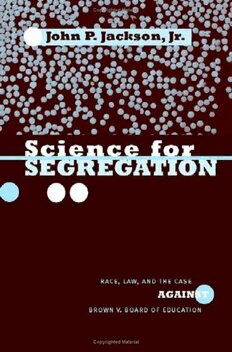
Science for Segregation: Race, Law, and the Case against Brown v. Board of Education PDF
304 Pages·2005·1.749 MB·English
Most books are stored in the elastic cloud where traffic is expensive. For this reason, we have a limit on daily download.
Preview Science for Segregation: Race, Law, and the Case against Brown v. Board of Education
Description:
With the fiftieth anniversary of the landmark Supreme Court decision Brown v. Board of Education now upon us, many have begun to reflect upon how the case altered the course of civil rights and education in America. In a fascinating but understudied chapter of the years following this momentous decision, John Jackson examines the scientific case launched in Brown’s wake to try to dismantle the legislation. Offering a trenchant assessment of the so-called scientific evidence, Jackson focuses on the 1959 formation of the International Society for the Advancement of Ethnology and Eugenics (IAAEE) whose expressed purpose was to objectively investigate racial differences and publicize their findings. Notable figures included Carleton Putnam, Wesley Critz George, and Carleton Coon. In an attempt to link race, eugenics and intelligence, they launched legal challenges to the ruling, each chronicled here, that were tried and ultimately unsuccessful. Speaking volumes about the legacy of racism, we can see similar arguments alive and well today in such books as The Bell Curve and in other debates about race, science, and intelligence. With meticulous research and a nuanced understanding of the complexities of race and law, Jackson tells a disturbing but all-too-familiar tale about race in America.
See more
The list of books you might like
Most books are stored in the elastic cloud where traffic is expensive. For this reason, we have a limit on daily download.
